People
'None of us is as good as all of us'. Maestro Tabaréz
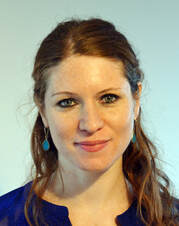
Carolina Rezaval- Group leader
Carolina was born in Patagonia, Argentina. She earned her Ph.D. in Biology from the University of Buenos Aires. Her PhD work, under the supervision of Dr. Fernanda Ceriani, focused on circadian rhythms and neurodegeneration in Drosophila. Her post-doctoral research at the University of Oxford explored the genetic and neural mechanisms of sexual behaviours in Drosophila. As a BBSRC researcher co-investigator with Prof. Stephen Goodwin at Oxford, she studied how the fly brain differs between the sexes, and how these differences lead to distinct female and male behaviours. In April 2018, Carolina was awarded a Birmingham Fellowship, enabling her to establish her independent research group at the University of Birmingham. By 2021, she became an Associate Professor in Neurobiology and took on the role of Module Lead for Year 3 Cellular Neurobiology. That same year, she was appointed as a Fellow member of the FENS-Kavli Network of Excellence and then selected as a board member. Carolina's research has received support from a range of funding bodies, including the UK
Research Council, Leverhulme Trust, British Council, The Royal Society, and the Wellcome Trust. Watch a 3 minute video about her work here.
Carolina was born in Patagonia, Argentina. She earned her Ph.D. in Biology from the University of Buenos Aires. Her PhD work, under the supervision of Dr. Fernanda Ceriani, focused on circadian rhythms and neurodegeneration in Drosophila. Her post-doctoral research at the University of Oxford explored the genetic and neural mechanisms of sexual behaviours in Drosophila. As a BBSRC researcher co-investigator with Prof. Stephen Goodwin at Oxford, she studied how the fly brain differs between the sexes, and how these differences lead to distinct female and male behaviours. In April 2018, Carolina was awarded a Birmingham Fellowship, enabling her to establish her independent research group at the University of Birmingham. By 2021, she became an Associate Professor in Neurobiology and took on the role of Module Lead for Year 3 Cellular Neurobiology. That same year, she was appointed as a Fellow member of the FENS-Kavli Network of Excellence and then selected as a board member. Carolina's research has received support from a range of funding bodies, including the UK
Research Council, Leverhulme Trust, British Council, The Royal Society, and the Wellcome Trust. Watch a 3 minute video about her work here.

Laurie Cazale-Debat-Marie Skłodowska-Curie Post-doctoral Fellow
Laurie obtained a Research Master in Neuroscience, Cognition and Behaviour from the University of Toulouse., France Her scientific interests have focused on understanding how sensory and social experiences occurring during early developmental stages impact the expression of social behaviours in arthropods. For her PhD, Laurie joined the lab of Jean-François Ferveur, University of Burgundy, Dijon, where she addressed this question using Drosophila as a model organism. Taking advantage of sophisticated neurogenetic tools available in fruit flies, she studied changes in adult behaviour following exposure to pheromones during larval stages. As a post-doc in the lab of Carolina Rezaval, she is looking to deepen her understanding of the neural mechanisms underlying behavioural decisions. She recently won a prestigious Marie Curie fellowship to continue her work in the lab.
Laurie obtained a Research Master in Neuroscience, Cognition and Behaviour from the University of Toulouse., France Her scientific interests have focused on understanding how sensory and social experiences occurring during early developmental stages impact the expression of social behaviours in arthropods. For her PhD, Laurie joined the lab of Jean-François Ferveur, University of Burgundy, Dijon, where she addressed this question using Drosophila as a model organism. Taking advantage of sophisticated neurogenetic tools available in fruit flies, she studied changes in adult behaviour following exposure to pheromones during larval stages. As a post-doc in the lab of Carolina Rezaval, she is looking to deepen her understanding of the neural mechanisms underlying behavioural decisions. She recently won a prestigious Marie Curie fellowship to continue her work in the lab.
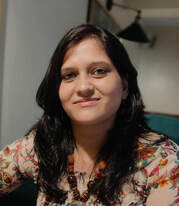
Devika Bodas-Post-doctoral Fellow
Devika obtained her M.Sc. in Biotechnology from University of Pune, India. Her broad research interest is to understand the neural mechanisms underlying context-dependent modulation of animal behaviour. She completed her PhD under the guidance of Prof. Aurnab Ghose at Indian Institute of Science Education and Research, Pune. During her PhD, she investigated how internal states modulate the circuit functioning to regulate the plasticity of innate behaviours using adult zebrafish as a model system. As a postdoctoral researcher in Dr. Carolina Rezaval’s lab, her research will focus on the neuronal mechanisms underlying behavioural decision making in fruit flies.
Devika obtained her M.Sc. in Biotechnology from University of Pune, India. Her broad research interest is to understand the neural mechanisms underlying context-dependent modulation of animal behaviour. She completed her PhD under the guidance of Prof. Aurnab Ghose at Indian Institute of Science Education and Research, Pune. During her PhD, she investigated how internal states modulate the circuit functioning to regulate the plasticity of innate behaviours using adult zebrafish as a model system. As a postdoctoral researcher in Dr. Carolina Rezaval’s lab, her research will focus on the neuronal mechanisms underlying behavioural decision making in fruit flies.
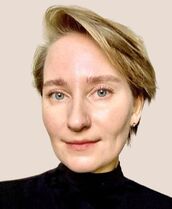
Olga Procenko- Post-doctoral Fellow
Olga obtained a Master's degree in Ecology and Evolutionary Biology from Queen Mary University London, UK. Her scientific interest is predominantly focused on understanding animal behaviour and the mechanisms underlying it. During her master's program, she investigated sociocognitive processes in bumblebees, specifically exploring the potential for cultural transmission. For her PhD, Olga joined Nityananda lab at Newcastle University, UK. She further delves into studying how inner states, emotional-like states, influence visually guided decision-making in bumblebees. As a post-doc in the lab of Carolina Rezaval, Olga continues to investigate decision-making in insects. Her current research project will focus on understanding the neuroethology of conflicting decision-making in fruit flies.
Olga obtained a Master's degree in Ecology and Evolutionary Biology from Queen Mary University London, UK. Her scientific interest is predominantly focused on understanding animal behaviour and the mechanisms underlying it. During her master's program, she investigated sociocognitive processes in bumblebees, specifically exploring the potential for cultural transmission. For her PhD, Olga joined Nityananda lab at Newcastle University, UK. She further delves into studying how inner states, emotional-like states, influence visually guided decision-making in bumblebees. As a post-doc in the lab of Carolina Rezaval, Olga continues to investigate decision-making in insects. Her current research project will focus on understanding the neuroethology of conflicting decision-making in fruit flies.
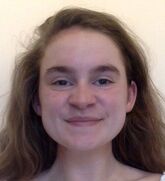
Megan Day- MIBTP PhD student
Megan completed her Msci project in the Rezaval lab, looking at how the brain makes decisions when faced with conflicting options. She was accepted into the prestigious BBSRC-MIBTP programme to do PhD in the lab.
Megan completed her Msci project in the Rezaval lab, looking at how the brain makes decisions when faced with conflicting options. She was accepted into the prestigious BBSRC-MIBTP programme to do PhD in the lab.
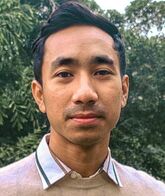
Milan Narzary- PhD student
Milan obtained his M.Sc. from University of Hyderabad, India, where he completed his thesis under Dr. Sudipta Saraswati. His research involved characterising the role of a protein, mul1, in a Parkinson’s disease model of Drosophila. Following his master’s, he joined Dr. Sheeba Vasu’s lab at Jawaharlal Nehru Centre for Advanced Scientific Research, where he investigated how gap junctions modulate circadian rhythms. He is captivated by the capabilities of neuron’s electrical activity to encode complex physiological and behavioural phenomena. Currently, at the Rezaval lab, as a PhD student he is interested in studying how neural activity influences decision making in fruit flies.
Milan obtained his M.Sc. from University of Hyderabad, India, where he completed his thesis under Dr. Sudipta Saraswati. His research involved characterising the role of a protein, mul1, in a Parkinson’s disease model of Drosophila. Following his master’s, he joined Dr. Sheeba Vasu’s lab at Jawaharlal Nehru Centre for Advanced Scientific Research, where he investigated how gap junctions modulate circadian rhythms. He is captivated by the capabilities of neuron’s electrical activity to encode complex physiological and behavioural phenomena. Currently, at the Rezaval lab, as a PhD student he is interested in studying how neural activity influences decision making in fruit flies.
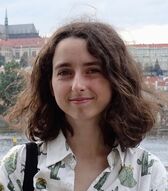
Marine Balcou- MIBTP PhD student
- Marine completed her BSc of Cellular Biology and Physiology at the University of Toulouse, France. Fascinated by the complexity of the brain, she then completed a joint master’s degree in neurosciences, at the Vrije Universiteit Amsterdam and the Charité Medical University of Berlin. Her main master’s project investigated the mechanisms of memory consolidation in fruit flies. There, she discovered the power of the drosophila model organism to explore the neural mechanisms underlying behaviours. Her goal is to bridge the gap between neurons, circuits and behaviours, to get a greater understanding of how the brain works. Now part of the MIBTP PhD programme, her PhD will focus on investigating the effects of chronic stress on the risk-taking behaviour of fruit flies.
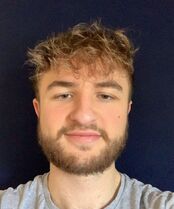
Patrick Cox-Master’s Student
Patrick is a student at the University of Birmingham studying Biochemistry on the integrated masters pathway. His interest in neurobiology drew him to Dr Rezaval’s lab, where he is currently carrying out a research project, aiming to discover how neural mechanisms in Drosophila influence their decision making.

Amber Kewin- Research Associate
Amber grew up in a small town in regional Queensland. She then moved to Brisbane to complete a Bachelor of Biomedical Science (Honours) at the University of Queensland. During her undergraduate degree she became particularly interested in neurobiology and molecular biology. She completed my Honours and then MPhil studies in the lab of Associate Professor Sean Millard validating candidate ALS genes in Drosophila. Following the completion of my MPhil she joined the lab of Professor Bruno van Swinderen as a Senior Research technician working on projects studying Drosophila sleep stages and presynaptic mechanisms of general anaesthesia.
Amber grew up in a small town in regional Queensland. She then moved to Brisbane to complete a Bachelor of Biomedical Science (Honours) at the University of Queensland. During her undergraduate degree she became particularly interested in neurobiology and molecular biology. She completed my Honours and then MPhil studies in the lab of Associate Professor Sean Millard validating candidate ALS genes in Drosophila. Following the completion of my MPhil she joined the lab of Professor Bruno van Swinderen as a Senior Research technician working on projects studying Drosophila sleep stages and presynaptic mechanisms of general anaesthesia.
